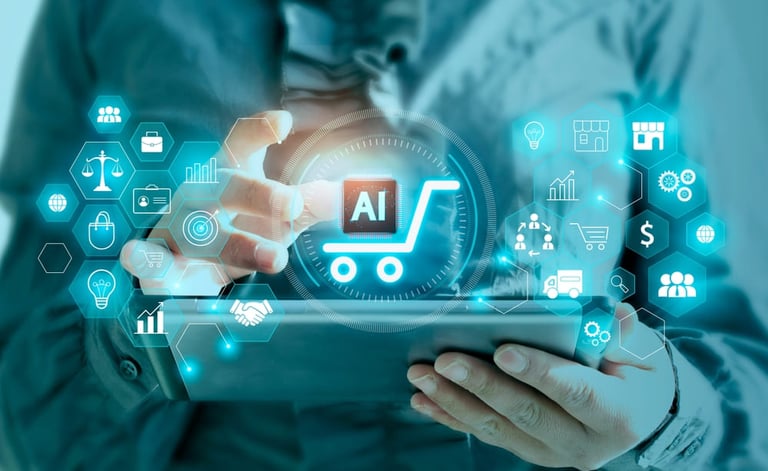Predictive Personalization: How AI Anticipates Customer Needs Before They Click
Predictive personalization is transforming digital marketing by allowing AI to anticipate customer needs before they even act. This blog explores how machine learning, data insights, and behavioral analysis empower brands to deliver hyper-personalized experiences. From boosting conversions to building long-term loyalty, discover how businesses can leverage predictive personalization while addressing challenges like data privacy and ethical AI use.
9/13/20254 min read


The evolution of personalized marketing into predictive personalization marks a significant shift in how companies interact with their consumers. Traditional personalized marketing often relied on static data, such as demographic details or previous purchases to inform marketing strategies. In contrast, predictive personalization leverages dynamic, real-time data analysis, enabling businesses to adapt their offerings and messaging based on emerging consumer behaviors. This shift illustrates a growing recognition of the importance of timing and relevance in today’s digital marketplace.
As digital marketing continues to evolve, predictive personalization has emerged as a pivotal strategy, particularly in environments characterized by high competition and demand for personalized experiences. With the multitude of options presented to consumers, businesses must differentiate themselves by delivering highly relevant content and product recommendations. By accurately predicting customer preferences and behaviors, predictive personalization helps brands increase conversion rates, improve customer satisfaction, and ultimately drive loyalty.
Through the integration of AI technologies, businesses can continuously refine their understanding of customer needs, adapting to changing preferences almost instantaneously. This creates a more engaging and efficient customer journey, transforming the way brands relate to their audience. As such, predictive personalization not only enhances individual customer experiences but also contributes significantly to a company's overall marketing success in an increasingly digital world.
The Role of AI and Machine Learning in Predictive Personalization
In the rapidly evolving landscape of digital marketing, the integration of artificial intelligence (AI) and machine learning has transformed the concept of predictive personalization. These technologies enable organizations to anticipate consumer needs with remarkable accuracy by leveraging comprehensive data analysis. The methodologies involved in gathering consumer behavior data encompass various sources, including browsing history, purchase patterns, and social media activity, allowing a multifaceted view of customer preferences and habits.
AI algorithms process vast quantities of data to identify trends and patterns that would be nearly impossible for humans to recognize. Machine learning enhances this process by employing advanced statistical methods to improve predictions as new data is aggregated. For example, companies can utilize collaborative filtering techniques, which analyze past consumer behavior across a user base to recommend relevant products or services tailored to individual preferences. This method has been successfully implemented by e-commerce giants, resulting in personalized shopping experiences that increase customer engagement and sales.
Furthermore, real-world examples highlight the effectiveness of predictive personalization strategies across various sectors. In the retail industry, businesses like Amazon employ sophisticated recommendation systems that analyze user interactions to suggest products based on inferred interests. Similarly, streaming services such as Netflix use machine learning algorithms to curate personalized content suggestions, enhancing user satisfaction and retention. These applications underscore the significant impact of algorithms and data science in forecasting customer needs.
Expert insights emphasize the importance of continuous learning within these systems. As consumer behavior evolves, predictive models must adapt to maintain accuracy. This agility, powered by AI and machine learning, reinforces the credibility and authority of predictive personalization efforts within organizations, ultimately driving customer loyalty and growth in an increasingly competitive marketplace.
Impact on Digital Marketing: Benefits and Challenges
The advent of predictive personalization has significantly reshaped digital marketing, offering various advantages that can elevate the consumer experience. By leveraging artificial intelligence (AI), businesses are now able to analyze vast quantities of data to foresee customer needs and preferences. This proactive approach enhances customer experience, as personalized recommendations increase relevancy, fostering deeper engagement. According to recent studies, companies adopting predictive analytics report conversion rates that surpass industry averages by 20% or more, directly correlating increased revenue with enhanced targeting strategies.
Furthermore, predictive personalization nurtures brand loyalty. When consumers regularly receive tailored content, they are more likely to return to a brand and engage with its offerings. For instance, major e-commerce platforms utilizing predictive algorithms have seen customer retention rates soar, a clear testament to the effectiveness of this marketing strategy.
Despite these noteworthy benefits, the integration of predictive personalization is not devoid of challenges. One major concern revolves around data privacy. As marketers gather and analyze personal data to refine predictive models, they must adhere to strict regulations. Ensuring compliance with laws such as GDPR is crucial to maintaining consumer trust. A breach in data privacy can lead to severe repercussions, both legally and reputationally.
Another challenge lies in the ethical use of AI. Stakeholders must remain vigilant to avoid inherent biases in algorithms that could skew marketing efforts or alienate specific customer segments. For instance, an AI model trained on non-diverse data can inadvertently marginalize underrepresented groups, affecting brand perception negatively.
In this rapidly evolving digital landscape, marketers must deftly navigate the benefits and challenges posed by predictive personalization. By doing so, they can harness the power of AI effectively while upholding ethical standards and consumer confidence.
Strategies for Marketers and Future Trends in Predictive Personalization
As businesses seek to enhance customer experiences through predictive personalization, employing effective strategies becomes paramount. Marketers are encouraged to leverage advanced analytics tools to gather and analyze customer data, which can provide invaluable insights into behavior patterns and preferences. AI-driven platforms, such as machine learning algorithms, can automate the data analysis process, enabling marketers to predict customer needs with greater accuracy. The use of customer relationship management (CRM) systems that incorporate predictive analytics can also facilitate targeted marketing efforts by offering personalized recommendations based on historical data.
To implement predictive personalization successfully, businesses should prioritize data cleanliness and integration. This entails ensuring that data from various sources is accurate and harmonized. By doing so, companies can track customer journeys more effectively and deliver timely, relevant content that resonates with the audience. Additionally, utilizing A/B testing can help marketers understand which personalized strategies yield the best results, allowing for continual optimization of campaigns and messaging.
Looking ahead, several trends are poised to shape the future of predictive personalization. The integration of artificial intelligence (AI) is expected to become increasingly sophisticated, allowing for more nuanced understanding of customer behavior. Moreover, as consumer awareness around data privacy grows, businesses will need to navigate the fine line between personalization and privacy. Developing transparent data usage policies can build trust with customers while enhancing their personalized experiences.
Furthermore, the concept of hyper-personalization is emerging, where companies will go beyond basic demographics to tailor offers and experiences at an individual level. This trend necessitates businesses to stay informed about advancements in technology and evolving consumer expectations. By adapting to these changes and embracing predictive personalization tools, companies can maintain a competitive edge in an increasingly complex digital landscape.
Understanding Predictive Personalization
Predictive personalization is an advanced marketing strategy that utilizes artificial intelligence (AI) and machine learning algorithms to enhance customer engagement by anticipating their needs and preferences. This innovative approach analyzes vast amounts of consumer data, including past behaviors, purchasing patterns, and demographic information, allowing businesses to tailor their marketing efforts accordingly. By utilizing predictive models, brands can foster deeper connections with their audience by providing tailored experiences that resonate with individual customers, rather than broad, generic outreach.
Expert digital marketing solutions for your business.
Reach Out To Us
📞+91-7060648052
📞+91-7906148971
© 2024. All rights reserved.
Quick Links
Find Us On Social Media


Get To Know More About Us
